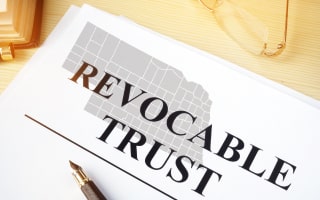How to Find Owners of Properties
in Nebraska

Property ownership in Nebraska is overseen by Chapter 76 of the state code, which focuses exclusively on real estate. For example, the terms of real property are defined by 76-101. Real estate, deeds, mortgages, and conveyances are also defined in this chapter. The various types of ownership that are legally allowed in Nebraska include joint tenancy, sole ownership, and tenants in entirety.
When you want to research a piece of real estate, the Nebraska county assessor is tasked with maintaining digital and physical records in the form of property cards. This requirement is detailed in Title 350, Chapter 10 of the administrative code for the Nebraska Department of Revenue.
These records are easy to find if real estate is owned by a single person. However, information about property ownership may be difficult to source if the property is held by a legal entity, such as a trust or corporation. In these cases, you may need to consult additional resources, such as title companies or legal professionals, to uncover ownership details. Sometimes, you may also need to cross-reference multiple public records, including deeds, tax records, and business filings, to identify the owners of the property.
How Do You Find Owners of a Property in Nebraska?

When you decide to search for the owner of a property, there are numerous options available to you, including everything from online resources to public records at your county's registry of deeds.
Registry of Deeds
A registry of deeds is a comprehensive database that holds every real estate document related to property ownership. If you access the Nebraska registry of deeds, you can obtain information about encumbrances, liens, mortgages, and property taxes for a specific property. To search these records, provide the property address or parcel ID. The owner's name should also help you find the property in question.
Every county in Nebraska has online databases that the public can enter if they want to search for documents and data from the Nebraska Registry of deeds. The databases for the most populous counties are linked below:
Land Records Website
Nebraska land records are generated and recorded whenever a property is sold, gifted, or transferred. If a lien is placed on the property, information about it will be included in the land record. You should be able to gain access to these documents on the county's property search website. They're also available at the county clerk's office. To obtain these records, you must provide the county clerk with the address or the parcel ID.
City or Town Assessor's Office
The county assessor is responsible for identifying the value of every residential home and commercial building in their jurisdiction. Once the assessor updates the value of your home, your property taxes will likely increase. To determine a property's value for taxation reasons, an assessor collects the following records:
- Property maps
- Ownership documents
- Tax assessment records
- Building details
- Exemptions
- Previous sales documents
You can choose to obtain these records online or visit the Nebraska county assessor's office. These documents should help you identify a property's owner. The assessor's offices for the most populous Nebraska counties are linked below:
- Douglas County
- Lancaster County
- Sarpy County
- Hall County
- Buffalo County
- Dodge County
- Madison County
- Scotts Bluff County
- Platte County
- Lincoln County
Tax Records
Your local assessor's office should also house tax records for every property in the area. These documents contain everything from the names of the current owners to the history of tax payments. You can also find a history of the property's assessed values in these records. You can usually request tax records online by visiting the assessor's website.
Title Company/Agency
Title companies have access to databases that are filled with property records. In Nebraska, these companies provide homeowners and buyers with title search services to determine if the property's title is free of defects and claims. The service will provide you with a comprehensive look at the property's ownership history, which is necessary before you buy a rental home or commercial building. These services cost around $75-$180 in Nebraska.
If you're still having difficulty finding property ownership information, consider asking the neighbors. While this is often a last resort, it might give you information that you're unable to find in the public records. Real estate websites might also list property ownership information. Consider hiring a real estate lawyer or agent who's familiar with the area to inquire about ownership details.
![]() Online Services
Online Services
Although they aren't as exhaustive as official Nebraska records, property ownership information can also be accessed through real estate websites like PropertyChecker.com. If you know the property's parcel ID or address, you can search statewide records to identify everything from tax records to loan details.
PropertyChecker.com maintains an up-to-date database of every piece of real estate in Nebraska. The records you can obtain about a specific property include the following:
- History of property values
- Sales history
- Lien records
- Loan records
- Deed information
- Property details
- Neighborhood info, including local schools and crime statistics
- Tax records
- Foreclosure details
- Information about building permits
- Names of owners
What Are the Different Types of Property Ownership in Nebraska?

Many different types of property ownership are possible in Nebraska. While sole ownership is the most common, properties can also be owned by spouses, business partners, corporations, and other unrelated parties. By understanding the basics of property ownership and the different types, you can make a more informed decision about which type of title is best for you.
If you make the right decision for your property or your investment portfolio, you'll have some control over your taxes, liability, access to finance, and risk. Every form of property ownership has benefits and financial implications that you should know about. A few of the most common types of ownership in Nebraska are joint tenancy, sole ownership, and tenancy in common. The advantages and implications of each type of ownership are explained below:
-
Sole Ownership: One person has complete rights to the property. Total control over how the property is used and other important decisions. Liability for the property taxes and debt that build up.
-
Joint Tenancy: Multiple people have equal shares of a property. Right of survivorship and easy transfer after death. If one owner wants to sell, the tenancy will be severed.
-
Tenants by Entirety: Married couples can enter into this type of joint tenancy. Considerable protection from creditors. Spouses must agree on every property decision.
-
Community Property: Equal ownership is established when both spouses purchase property during marriage. Spouses have equal rights to manage and sell the property. Home will be divided equally if the marriage comes to an end.
-
Tenancy in Common: Two or more people have equal or unequal shares without access to survivorship rights. An owner can sell their shares without approval from the others. Owners might have disagreements over how to sell or manage the property.
-
Condominium Ownership: Multiple individuals live in a sizable complex and have shared ownership of common areas. Full ownership of personal living space. Need to follow HOA rules and pay monthly dues.
-
Cooperative Ownership: Residents buy and collectively own a property. Allows for community control and lower upfront costs. Members must approve before shares are sold.
-
Trust Ownership: A home or commercial building is held in a trust until beneficiaries can claim it. Protects assets from creditors while also offering several tax advantages. Managing and transferring the property can be a hassle.
-
Life Estate: Ownership of the property lasts until the individual dies. Individuals can use the property without limits until they pass away. The remainderman needs to agree to the transfer or sale of the property.
Finding the Owner of a Trust or Corporation that Owns Properties in Nebraska

Many people and entities can own real estate in Nebraska. Along with an individual, properties can be purchased by partnerships, limited liability companies (LLCs), C or S corporations, or trusts. If you're looking for the owner of a corporation or trust, you can obtain help from a local Nebraska title company or real estate attorney.
While you may be able to access this information yourself, this process can take a few steps. You might be tasked with cross-referencing some of the public records that are tied to the property, which include mortgages, deeds, and tax records. These documents may also be available at your local chamber of commerce. Business databases like Westlaw and LexisNexis can also direct you to this information.
Finding the Owner of a Trust in Nebraska
If you believe that a property is held by a trust, finding the owner might prove challenging. The names of trust owners don't need to be recorded in Nebraska. On the other hand, you might gain access to the info if an LLC owns the trust. Consider hiring a local real estate lawyer who knows where to find the necessary documents.
Finding the Owner of an LLC in Nebraska
The Nebraska Secretary of State's website provides a Corporation and Business Search tool that can direct you to any registered LLC in the state. You can access specific records by entering the company's name or account number. Once you perform a search, you should receive documents that contain the names of every LLC member.
Finding the Owner of a Corporation in Nebraska
Use the Corporation and Business Search tool that's provided on the Secretary of State's website. Along with the owner, you should also receive the names of every member of the company's executive team.
Common Methods of Property Transfer in Nebraska

Property deeds are the final documents that are drafted before completing the sale or transfer of a home. These documents should include a description of the sale as well as the names of the seller and buyer. The most common deed types are described in the following:
-
Quitclaim Deed: A quitclaim deed offers practically no protection against liens or ownership claims. This deed is often drafted when the owner wishes to quickly transfer the property to another entity. For example, family members can use this deed when transferring real estate.
-
General Warranty Deed: This deed provides a guarantee to the buyer that there aren't any outstanding liens or ownership claims on the title. It also offers protection against future ownership claims.
-
Special Warranty Deed: A special warranty deed doesn't provide as much protection as a general warranty. The buyer will receive two assurances. First, the seller guarantees that they haven't gifted or transferred the property to someone else. Second, the document indicates that there aren't any undisclosed liens or encumbrances on the property that arose while the current owner held the property.
Step-by-Step Guide to Property Transfer in Nebraska

Conveying a property title comes with numerous legal and administrative processes, all of which you should understand before you take part in a sale or transfer. Begin this process by determining the type of transfer you'd like to do, which could involve gifting the property or placing it in an inheritance.
Make sure you perform a title search early in the closing process. You can use this service to identify any liens or encumbrances that need to be dealt with. Consider buying some title insurance as well to protect against unexpected issues.
The deed will now be prepared, which means that the details of the transfer will be written in a document. Both parties will need to sign the document. Make sure a notary public witnesses you signing the deed. Keep in mind that you'll need to pay a transfer tax before the closing date, which amounts to $2.25 per $1,000 of the sale price in Nebraska.
After the taxes are paid, the deed will be reviewed and recorded. In Nebraska, the recording fees are $10 for the initial page and $6 for all additional pages. Once the title is recorded, make sure you update your records. Consider calling your mortgage lender. You'll also need to update the assessor's office to ensure you don't receive future tax bills.
Property Ownership Guide
- How to Find Owners of Properties in Nebraska
- How Do You Find Owners of a Property in Nebraska?
- What Are the Different Types of Property Ownership in Nebraska?
- Finding the Owner of a Trust or Corporation that Owns Properties in Nebraska
- Common Methods of Property Transfer in Nebraska
- Step-by-Step Guide to Property Transfer in Nebraska
Nebraska Homeowner Lookup
- Owner(s)
- Deed Records
- Loans & Liens
- Values
- Taxes
- Building Permits
- Purchase History
- Property Details
- And More!
Property Ownership Guide
- How to Find Owners of Properties in Nebraska
- How Do You Find Owners of a Property in Nebraska?
- What Are the Different Types of Property Ownership in Nebraska?
- Finding the Owner of a Trust or Corporation that Owns Properties in Nebraska
- Common Methods of Property Transfer in Nebraska
- Step-by-Step Guide to Property Transfer in Nebraska